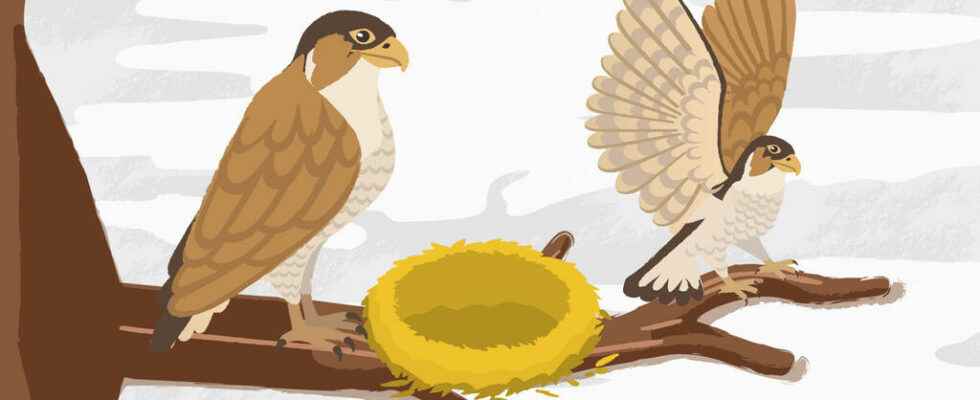A raptor with unparalleled speed and precision in hunting, KIMANGLO the Sparrowhawk feeds on insects, mice and birds.
One day, God gives her the grace to have a little one. KIMANGLO the Sparrowhawk calls him BAKANTI, which means: “the one who listens to the advice given to him”. KIMANGLO the Sparrowhawk explains hunting and the dangers it entails. The mother Sparrowhawk encourages her son to favor chicks or any other edible species that can enter her greenhouses. However, she advises him to be careful with certain species such as BEKINMIN’s family, the duck.
Vigorous, but inexperienced, the young hawk BAKANTI interprets this last piece of advice as a challenge to be met.
He’s like those people who think they’re told “don’t do this” because they’re underestimated? You see ?
On his first day of hunting, despite his mother’s warnings, BAKANTI targets a duckling. It swoops down on it, grabs it in its claws and flies away with its prey. Once back home, he is admired by the whole family, except his mother KIMANGLO. Realizing that she is unhappy, BAKANTI approaches her, worried:
BAKANTI: “ Mom, what’s going on? Looks like you’re not happy with my achievement! »
KIMANGLO L’EPERVIER: ” Bakanti when I talk to you, you don’t listen. I’m worried about the risk you took. Besides, tell me how your victim’s mother reacted? »
BAKANTI: “Mom, she just turned her head to look at me then she left with her other children without saying a word. I figured she didn’t like this one. »
KIMANGLO L’EPERVIER: “My son, a mother who doesn’t love her children, that doesn’t exist. I’m sure she’s gone to plot her revenge. Listen to your mother, be very careful with the choice of your victims. »
While listening with one ear to his mother’s advice, BAKANTI dreams of the admiration he would arouse in his clan if he repeated his exploit.
Do you see those children who pretend to listen to the advice given to them, but who do as they please?
Once again, BAKANTI targets a duckling. But this time, he comes across a cousin BEKINMIN who doesn’t let it go. If you go to a community and you didn’t see the character of the people on the first day, you will undoubtedly see it on the second. The duck pursues BAKANTI until she snatches her hold and the young sparrowhawk returns home empty-handed and confused.
Mama Sparrowhawk realizes that her son hasn’t followed her advice. She takes him in her wings and consoles him.
KIMANGLO L’EPERVIER: “My son, it was from experience that I told you to beware of this family. From now on, you will have to be very careful in choosing your targets. »
On his third attempt, BAKANTI takes aim at a chick that he tears away from his mother’s affection. Distraught, she starts screaming, uttering all sorts of curses at the kidnapper. But the young hawk continues its flight and finds its clan, its booty between its claws.
Once back home, his mother KIMANGLO asks him:
KIMANGLO L’EPERVIER: “What was the reaction of the mother hen? »
BAKANTI: “She screamed, swore at me, and cursed at me. »
KIMANGLO L’EPERVIER: “Good, that’s good, my son. Those who curse and howl vent their anger, while those who say nothing are to be feared, their reactions unpredictable. »
You now understand why in our villages, the sparrowhawks prefer to take the chicks rather than the ducklings.
Africa in story is a series created by the NGO Des Livres Pour Tous – Côte d’Ivoire and the collective Making Waves, in partnership with RFI. This project has received support from the “Access Culture” scheme of the French Institute in Paris and the French Development Agency (AFD), the “ACP-EU Culture for West Africa – Awa” program from the French Institute and the Kôrè Cultural Centre, the “Agir” system of the Department of Seine-Saint-Denis and the Île-de-France Region.
Subscribe to the “Africa in Tales” podcast
Africa in story is available to listen to on all podcast platforms: Apple Podcasts, Spotify, Deezer, Podcast Addict, Castbox, Google Podcasts or any other application using the RSS feed.
